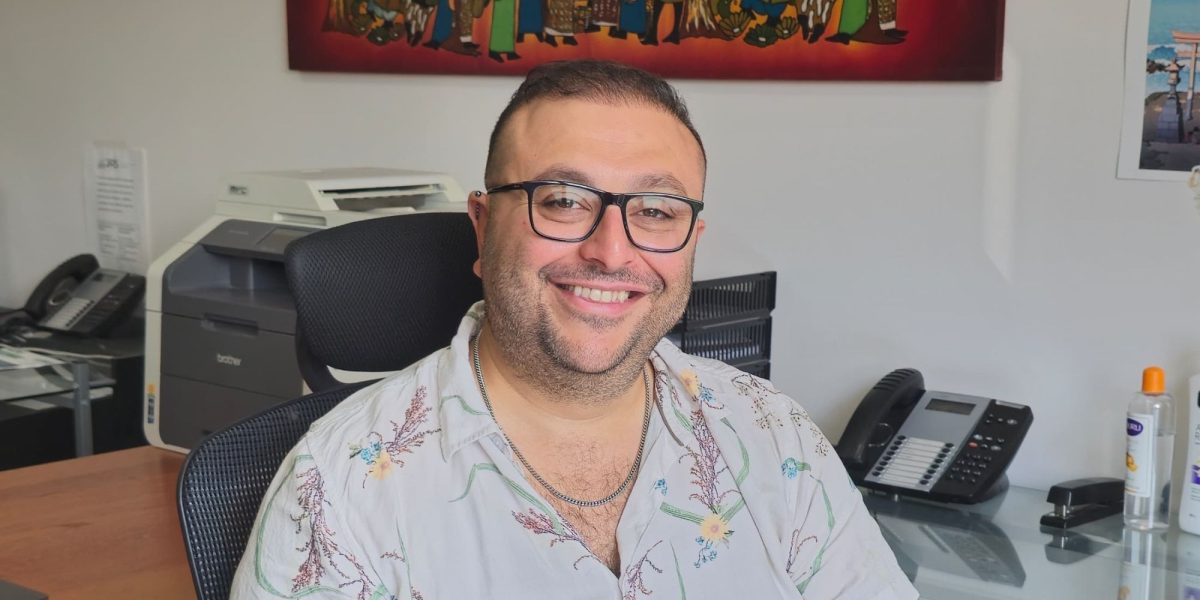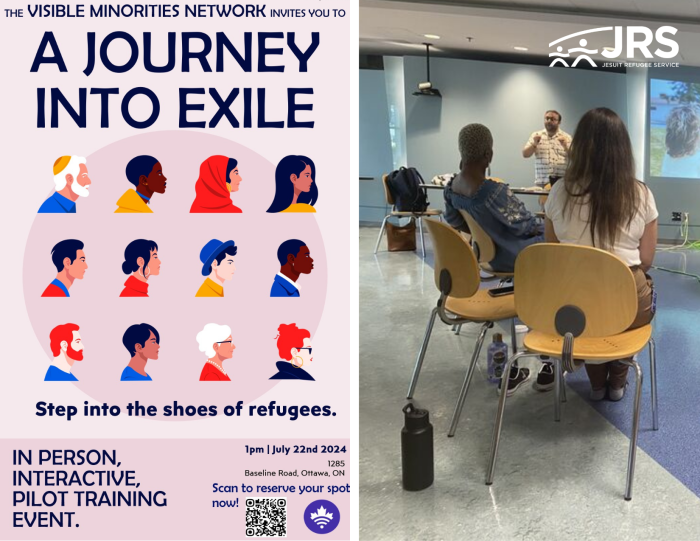“A Journey into Exile” is now offered to public servants
19 August 2024|Joanna Kozakiewicz

Tevfik Karatop was born in Turkey and grew up in Istanbul. After completing his BA in Economics and MA in Cultural Studies at Sabanci University in Istanbul, he worked in marketing and sales. Tevfik grew up Muslim but eventually was drawn to Christianity. He was particularly drawn to Ignatian spirituality, which encouraged him to listen closely to those he serves.
After arriving in Canada in 2016, he completed a Bachelor of Theology and a Master of Arts in Religious Studies at McGill University and a Master of Divinity from the Montreal Diocesan Theological College. After years of discernment, he found his vocation in serving refugees. He has been working as a Project Manager for the Jesuit Refugee Service in Montreal since June 2022.
He is also responsible for JRS’ awareness-raising project called A Journey into Exile and is privileged to share refugee stories across North America.
Most recently, Tevfik collaborated with the federal government on A Journey into Exile. In this interview, we find out more about his experience.

JRS: Can you tell us more about your experience collaborating with the federal government on A Journey into Exile?
Tevfik Karatop, Project Manager: On July 22, the Visible Minorities Network and I organized A Journey into Exile session with 24 public servants in Ottawa. We also developed a new interactive discussion part for this session. Our objective was to create a safe space for newcomers and Canadian citizens to discuss the challenges of being newcomers, as well as the contributions they can bring to their communities, the federal government, and broader society.
Who is the visible minority network? What do they do?
T.K: The Visible Minorities Network is a group of federal servants who are volunteers who work hard to raise awareness about refugees and other newcomers.
What was your experience with the federal public servants for your simulation exercise most recently?
T.K: Between September 2023 and July 2024, we had 65 sessions with almost 1700 participants. Each group is different from each other, but my experience in Ottawa with public servants was exceptionally positive in July. They are a motivated group that aims to raise awareness about the challenges that refugees go through and to introduce our simulation exercise to more public servants. Since there were many newcomers among the participants, their participation was precious, as they were gracious enough to share their experiences. I also appreciate the work of the Visible Minorities Network, as they voluntarily work to raise awareness in the public sector about refugees and newcomers.
As Project Manager, why did you want to offer this simulation exercise for the federal public servants specifically?
T.K: In February 2024, I was in Ottawa for sessions with several schools and parishes. Some of the Visible Minorities Network participated in one of my sessions. After this session, we decided to organize a test session in Ottawa. We believe that public servants directly affect the lives of refugees as they provide essential services therefore, raising awareness in the public sector is particularly important for us to enhance the lives of refugees in Canada.
Why do you think it was important for them to experience it?
T.K: I can confidently say that our main objective in the project is to raise awareness and convince people to take action for refugees. In the last seven years, many participants have initiated different personal and community projects to accompany refugees. It is no different with the public servants who participated in our session. In their contexts, they aim to create a more welcoming public sector for refugees and point out the challenges faced by newcomers who work for the federal government.
What part of the exercise was interactive?
T.K: After A Journey into Exile, we spent half an hour in a discussion. For this part, Fiona Barbaro Sant, who is a member of the Visible Minorities Network and myself, created a refugee character who is looking for a job in the public sector. After we introduced this character based on real refugee stories, we opened the floor for two major contributions.
- What are the challenges of finding a public sector job and what challenges come after?
- How do refugees and newcomers contribute to the public sector, their communities, and society?
During the discussion, most participants shared their experiences and opinions.
Can you tell us more about the character you created?
T.K: Our strategy for A Journey into Exile is storytelling. We created this character called Mohammed Haddid, a Syrian refugee. He was sponsored five years ago and lives in Canada. He is looking for a public service job as an IT engineer.
More specifically, I told the participants that the character was born in Aleppo, Syria, in 1989. He finished his degree in 2011 at Damascus University. In the early days of the civil war, he started to work as an IT engineer at Aleppo Municipality. He escaped Syria after being drafted into the military and arrived in Istanbul, Turkey, in 2013. He lived in Istanbul until he was resettled in Canada in 2019. During the last 5 years in Canada, he took several jobs just to survive, and he is currently looking for a public service job.
We discussed with the participants the different challenges and possible contributions of Mohammed to the public sector in his community.
Where is this project going to go next? In other words, what is in store for the future?
T.K: After our successful session in July 2024, we will organize a French session and discuss the possible ways of offering A Journey into Exile to more public servants in the future.



